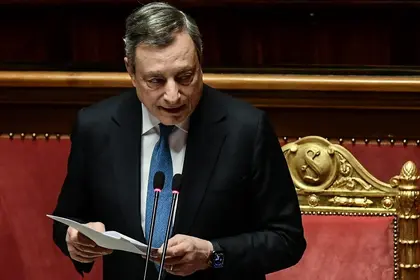Italian lawmakers voted overwhelmingly to back Prime Minister Mario Draghi’s policy on Ukraine Wednesday, the day after the largest partner in his coalition government imploded over the issue.
Draghi has taken a firm line on Russia’s invasion, sending weapons to Kyiv, backing sanctions on Moscow despite Italy’s reliance on Russian gas and supporting Ukraine’s hopes of joining the European Union.
JOIN US ON TELEGRAM
Follow our coverage of the war on the @Kyivpost_official.
But there have been rumblings of unease within his coalition government, which burst into the open Tuesday with a split in parliament’s biggest party, the Five Star Movement.
Foreign Minister Luigi Di Maio announced he was leaving the party, accusing it of showing “ambiguity” over Ukraine at a time when Western unity was crucial.
An estimated 60 lawmakers are following him into the grouping, dubbed “Together for the Future” — just over a quarter of the Five Star’s parliamentary members.
The move risks upsetting the fragile balance of power in Draghi’s coalition government, a year before general elections are due and at a difficult time for Italians battling skyrocketing inflation.
But a vote Wednesday suggests parliament still backs the premier, with the lower Chamber of Deputies agreeing by 410 to 29 a resolution supporting the Ukraine policy, albeit with more input from lawmakers.
The Senate similarly approved it Tuesday.
“Unity is essential in these moments because the decisions that must be taken are very difficult,” Draghi said before Wednesday’s result, which came one day before an EU summit in Brussels begins.
In an uncharacteristically combative address to deputies, the former head of the European Central Bank accused those who disagreed with his policy of effectively calling on Kyiv to surrender.
“There is a fundamental difference between two points of view. One is mine — Ukraine must defend itself, and sanctions and the sending of weapons serve this goal,” Draghi said to applause.
“The other point of view is different. Ukraine must not defend itself, we shouldn’t do sanctions, we shouldn’t send armaments, Russia is too strong, why should we take her on, let Ukraine submit.”
– The end –
Di Maio had made a similar attack on members of his own party at the weekend, paving the way for Tuesday’s defection.
Five Star leader Giuseppe Conte, a former premier, has argued that Italy should focus on a diplomatic solution, warning against getting involved in an escalating arms race.
Conte and Di Maio have been at odds since long before the war, however, reflecting a struggle for relevance within the party.
The once-maverick populists of Five Star upended the political order four years ago in winning a third of the vote in general elections, propelling them to power.
But after being part of three governments since then with a wide variety of coalition partners, critics say they stand for nothing and they are bleeding public support.
“It’s the end,” said the University of Bologna’s Piergiorgio Corbetta, a Five Star expert.
“It’s an end that’s been biding for a long while. And it will conclude with the next elections,” he told AFP.
Many commentators believe Draghi’s coalition government — involving all main political parties except the far-right Brothers of Italy — will start to splinter ahead of 2023 elections.
The Five Star split is likely to weigh on “the entire political system, starting with Draghi, who is now more shaky than before,” wrote La Stampa editorialist Marcello Sorgi.
The defections in Five Star leave the anti-immigration League of Matteo Salvini as the biggest party in parliament, but it too is struggling with waning public support.
But Corbetta predicted that even opposition lawmakers would show “a minimum of political responsibility” in supporting the government’s Ukraine policy.
You can also highlight the text and press Ctrl + Enter



